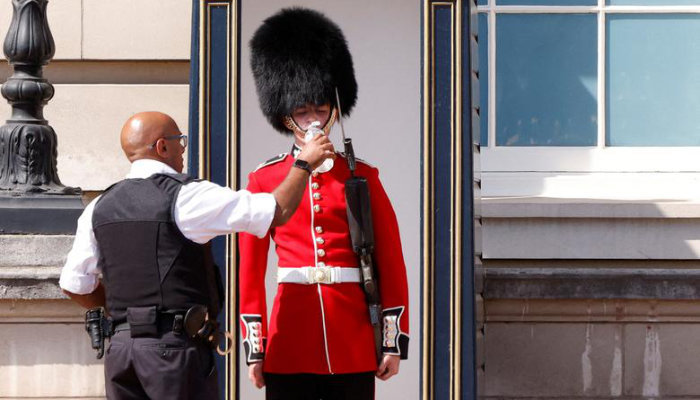In short:
- Gazprom declared force majeure on gas supplies to Europe
- Monkeypox cases in the US rose to almost 2,000
- The UN chief warns that humanity faces ‘collective suicide’ over the climate crisis
Economy, food security, gas
75% of US middle-class households report that their income is falling behind their living costs.
US gas prices should drop to $4 in the coming weeks. The emergency oil releases are scheduled to end by the end of the year, but oil companies should have increased production by then. In addition, OPEC still can produce a lot more oil. Here are the highest and lowest gas prices in the US today.
There is evidence that summer airfares are peaking due to inflation pressure. But prices will likely remain higher than they were a year ago.
According to a new report, Australia’s inflation is escalating due to rising corporate profits.
Heatflation: How sizzling temperatures drive up food prices. The European Central Bank looked at the evidence last year that abnormal temperatures can drive inflation. In 48 countries, they found hot summers had “by far the largest and longest-lasting impact” on food prices. The effects lasted almost a year and were most noticeable in developing countries.
Opinion: Food may be the ultimate weapon in the 21st century. The strangling of Ukraine shows how agricultural insecurity can be used to foment geopolitical chaos.
An Albuquerque gas station cut gas prices in half for a few hours to help customers with inflation. An interesting data point from the article: e-bikes sales are through the roof in Albuquerque.
Energy
Gazprom declared force majeure on gas supplies to Europe. Fear is growing that Russia may not restart the Nord Stream 1 pipeline at the end of its annual maintenance period on Thursday. The EU plans to stop using Russian fossil fuels by 2027 but wants supplies to continue while it develops alternatives.
Germany is considering extending the life of its three nuclear plants if Russian gas is cut off. Environmental and economy ministries in March did not recommend extending the plants’ life, citing various challenges and the need for extensive and costly safety checks. But the leading provider of nuclear safety testing said Germany’s nuclear plants could keep operating safely after December. Public support is rising in the face of a possible cut-off of Russian gas.
US coal plants are being turned into solar farms. Illinois alone will turn nine coal plants into solar farms or battery storage facilities within three years. Seven more states will follow suit in a similar time frame. Old plants are a great choice because they’re part of the country’s existing infrastructure and have substations.
Seven of the US’s biggest Bitcoin mining companies use nearly as much electricity as all the homes in Houston, the nation’s fourth-largest city, according to a new congressional study.
Australia will build at least four hydrogen refueling stations between Sydney and Melbourne. Here’s a good infographic and article on battery vs. hydrogen fuel cell:

Climate change, environment, extreme weather
England is under the country’s first-ever red heat warning. Temperatures of up to 106F (41C) should peak Tuesday. These temperatures are what UK forecasters thought 2050 would look like and can give us an insight into the future:
In 2020, the @metoffice produced a hypothetical weather forecast for 23 July 2050 based on UK climate projections.
Today, the forecast for Tuesday is shockingly almost identical for large parts of the country. pic.twitter.com/U5hQhZwoTi
— Dr Simon Lee (@SimonLeeWx) July 15, 2022
UK unions are calling for a legal limit on how hot it can get at work. According to the GMB union, workers shouldn’t work in temperatures above 25C (77F). There are no laws in the UK or Ireland that state any given temperature is too hot or cold to work, even though several MPs have recently backed a campaign for a legal upper limit of 30C (86F) in most workplaces or 27C (81F) for those doing strenuous activity.
Here are some photos of how people are dealing with the extreme heat wave in Europe.
Iran arrested several protesters over the drying of Lake Urmia—formerly the world’s largest salt lake. Until 1995, Lake Urmia was Iran’s main domestic tourist attraction before it began shrinking due to extreme drought, agriculture, and dam construction. Water levels have risen from their historic low, but it’s unclear if it’s because of higher rainfall or government initiatives.
UN Secretary-General Guterres said that humanity faces “collective suicide” over climate change. “Half of humanity is in the danger zone, from floods, droughts, extreme storms and wildfires. No nation is immune. Yet we continue to feed our fossil fuel addiction.” “We have a choice. Collective action or collective suicide. It is in our hands.” Guterres was in Berlin for the Petersberg Climate Dialogue to discuss the impacts of the climate crisis. The conference is one of the last opportunities to hammer out agreements among key countries before Egypt’s November Cop27 UN climate summit.
No, the plankton are not “All Dead.“ Plus, good conversations (both in the Reddit post and on Twitter) relevant to critical thinking/misinformation. Also, check community member July Lewis’s great post on Evaluating information – a prepper skill.
Opinion: The terrifying truth: Britain’s a hothouse, but one day 40C will seem cool.
Health
Monkeypox cases in the US rose to almost 2,000, with infections reported in 43 states. Some are criticizing the CDC’s response, while the CDC is pointing out that, despite challenges, they have expanded the case definition to encourage health care providers to test for the virus and they have dramatically increased the availability of vaccines (although demand is outstripping supply). Fauci said that the current case number is likely an undercount and that “we have to act like it will have the capability of spreading much more widely than it’s spreading right now.”
60% of Covid infections are asymptomatic. One more reason to keep wearing a mask.
Ghana confirms its first outbreak of the Marburg virus (a cousin of Ebola). Health officials have already mobilized, and for now, the virus seems contained.
988 is the new Suicide & Crisis lifeline number:
Today is a historical day for #suicideprevention & #mentalhealth in the U.S.! The National Suicide Prevention Lifeline, now known as the 988 Suicide & Crisis Lifeline, can be more easily reached by calling or texting 988, or chatting on https://t.co/rRqUSHvtQd. #988Lifeline pic.twitter.com/o8qHBfQgGQ
— 988 Suicide & Crisis Lifeline (@988Lifeline) July 16, 2022
The rest
US houses of worship are increasing security after shootings. Some churches are adding more security cameras, developing an active shooter plan, and applying for Department of Homeland Security funding. Speaking of shootings, a good guy with a gun stopped an active shooter in an Indiana mall.
A 16-year-old saved three teenagers who were swept into a river and the police officer who went to their rescue. Some learning lessons that stood out to me: the driver trusted their GPS and did not realize it was leading them into the water (a.k.a. death by GPS), and trying to rescue a drowning person who is panicking can be really dangerous for the rescuer.

You are reporting the comment """ by on